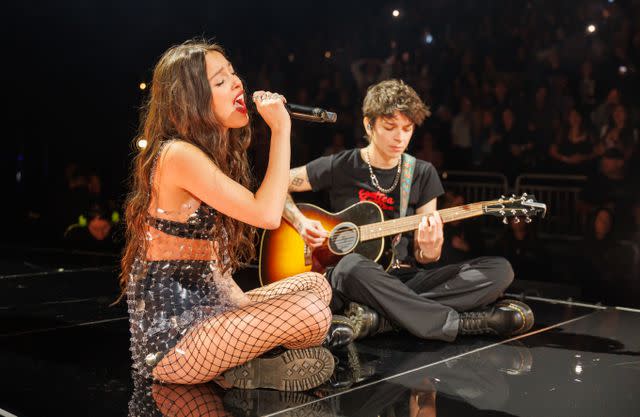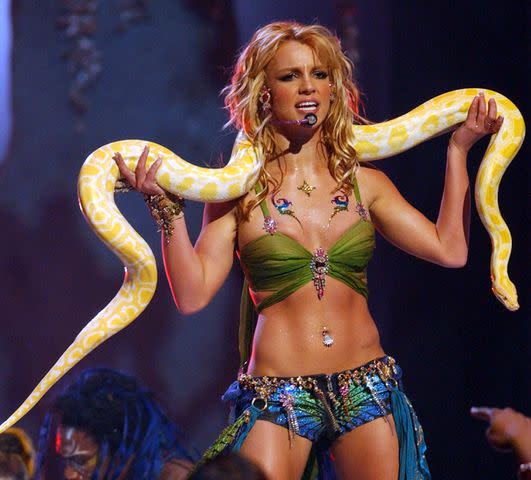As Young Stars like JoJo Siwa and Olivia Rodrigo 'Grow Up'—Are They Still Appropriate For Their Young Fans?
- Oops!Something went wrong.Please try again later.
- Oops!Something went wrong.Please try again later.
The stars your kids know and love are reinventing themselves, launching an important conversation to have.
:max_bytes(150000):strip_icc():format(jpeg)/Parents-GettyImages-2131648890-97a4be0208bd4fcf86cbec7450c4011f.jpg)
Jeff Kravitz / FilmMagic via Getty Images
Fact checked by Sarah Scott
JoJo Siwa was my daughter’s first concert. We wore matching shirts and fit right in among a crowd of JoJo Siwa mini-mes, decked out in oversized bows, rainbow attire, and side ponies. We marveled at her dance moves and cheered during her empowering messages about staying true to yourself. We didn’t know it that night, but it was one of the last times we’d see that technicolor, teeny-bopper side of JoJo Siwa—the very one she built her career on.
There’s this unspoken expectation for pop stars to stay frozen in time, remaining innocent and pure their entire careers. But pop stars often grow up faster than their young fans—which can feel alienating to them (and confusing to parents).
JoJo Siwa is a perfect example. She’s slowly been phasing out her oversized, signature bows and “aw shucks” attitude. Last year she even competed on Special Forces: World’s Toughest Test—a complete 180 from the TV shows that made her a household name, like Dance Moms and JoJo Siwa: My World.
Over the past few weeks, Siwa’s made it explicitly clear that she’s now a 20-year-old woman who curses in her songs, wears face paint (a la the rock band Kiss), and embraces a “bad girl” vibe. Think wholesome Sandra Dee in Grease transforming into a leather-wearing vixen.
Siwa’s video for her new song “Karma” is filled with sensual choreography and sexual tension. The song is the exact opposite of her sugary sweet, bubble gum pop songs about “High Top Shoes” or being a “Kid in a Candy Store.” I let my 9-year-old daughter watch the new video and held my breath waiting for her reaction.
“So, will she only have adults go to her concerts now?” she asked, a look of confusion on her face. I then asked my daughter what she thought of JoJo’s new look. “I miss her rainbows—and where is her dog BowBow?” was the response.
The sharp contrast to JoJo’s past self has caught many long-time fans off guard—not just my daughter. While I have zero issues if my daughter does decide to continue supporting JoJo, many parents are uneasy about allowing their younger kids to go on this new very grown-up journey with her.
The Right to Self Expression
Jillian Amodio, LMSW and founder of Moms for Mental Health, doesn’t think Siwa’s new music video is a bad choice or a mistake because she’s an artist with every right to express herself.
“If parents don’t like the content or don’t find it appropriate for their children, they need to ask themselves why they feel it is inappropriate and then explain it to their children,” says Amodio. “Celebrities are people too. Their bodies, their interests, their image, and their art belong to them. Of course, we can all benefit from assessing how our actions impact others, but no one—not even celebrities—should live a life dictated by the rules and expectations set by others.”
This is nothing new. Some may even call it a generational rite of passage. Remember when Britney Spears famously declared, “I’m Not a Girl, Not Yet A Woman”? The iconic song is like an unofficial battle cry for pop stars who burst on the scene young, wholesome, and innocent and then get chastised for—gasp—growing up.
The world came to a screeching halt when Britney and Christina Aguilera pranced onto the stage of the 2003 MTV Video Music Awards in virginal, white wedding gowns and kissed Madonna—on the lips. I look back on that time and clearly see that performance as symbolic. Madonna gave the girls her blessing to go forth and grow up (never mind that Britney was 21 and Christina was 22 at the time).
But there is a strategy behind it all, as many "child stars" transition to more mature artists. Publicists, managers, and other team members often work closely with their young clients during these shifts.
"It's a complex journey filled with challenges and opportunities. It's a chance for growth and evolution, but it also requires careful planning, effective communication, and collaboration," explains Grayce McCormick, publicist and producer at Lightfinder PR. "One key aspect of this process is timing. We often observe the audience's demographics and receptiveness to change before advising our clients when to transition. It may involve analyzing data on their fanbase, monitoring social media sentiment, and gauging the overall cultural landscape."
This is likely a strategy that mega pop star Olivia Rodrigo implemented once she turned 21 and started selling shot glasses as part of her merch and launched the Fund 4 Good campaign, a global initiative for people "seeking reproductive health freedom" on her current world tour. For a beat, contraceptives and morning-after pills were handed out at her concerts.

Christopher Polk / Billboard via Getty Images
It’s important to note that Rodrigo rose to fame after a start on the Disney+ series Bizaardvark, before transitioning to High School Musical: The Musical: The Series. That "seal of approval" from Disney also launched the careers of Britney, Christina, and other mega stars like Hilary Duff and Miley Cyrus (to name a few). Yet, when stars “age out” of Disney, there’s always a collective gasp—even though none of those stars ever deny they're no longer Mouseketeer material.
Rodrigo’s first album, Sour, had a parental advisory warning for six explicit songs—including her breakout hit “Drivers License.” And her latest album, Guts? The first track is called “All-American Bitch.'' That makes it all the more confusing when parents express their “outrage” after taking their tweens (and younger) to see Rodrigo's show and discover it doesn't have the family-friendly vibe of say, the Eras tour . . .
How Young Pop Stars Evolve Behind the Scenes
With so much emphasis on building a brand and image, it’s tough to be young, innocent, and prepubescent—and then try to pretend puberty didn't hit. Rey Roldan, President of Reybee PR was a publicist to stars like Britney Spears and the Backstreet Boys in the late ‘90s/early aughts. He started working with a 15-year-old Britney right before her first (and monster hit) single "... Baby One More Time" was released. To generate buzz, she did a lot of press that made her visible to fellow teenagers—like photoshoots for the tween clothing catalog dELiA*s or performing in malls.
“While Britney would often crinkle her nose at doing things like that, she had a really great work ethic and knew she wanted to appeal to girls her age,” recalls Roldan. “But as ‘...Baby One More Time’ exploded and Britney got a taste of ‘stardom,’ her interest in being seen as a ‘little girl’ started to wane. Like many her age, she wanted to act older, wear clothing that was ‘sexier’, and take control of her image.”
Roldan admits that preventing the young artists he worked with from growing up too fast was an “arduous and herculean task” because most kids who are not famous want to act like adults and be taken seriously. The difference is they have the luxury of making mistakes without a watchful public eye.
“But for kids in entertainment and ‘show business,’ their mistakes and missteps are often amplified to the nth degree, so they have to be hyper-aware of their actions,” he explains.
While young female stars endure so much scrutiny and criticism for “growing up”—it’s rare that young male stars receive the same backlash. Roldan admits that while it was okay for the Backstreet Boys to curse and act obnoxious on TV shows—Britney had to be on her best behavior.
“When the Backstreet Boys would do something questionable, people would say ‘boys will be boys’ but if Britney uttered a curse word, people clutched their pearls,” he says. “Young female stars have always had to keep that ‘daddy's little girl’ thing in check to not seem like a threat or a bad role model.”

Kevin Mazur / WireImage via Getty Images
The Important Conversations to Have with Your Kids
So, how should parents handle it when the pop stars their young, impressionable kids idolize inadvertently start “isolating” them simply by maturing faster? Tasha M. Brown, PhD, a licensed clinical psychologist and owner of TMB Psychological Services, says it’s a very important conversation to have because children do form strong attachments with favorite media personalities.
“One of the biggest questions that parents can anticipate from their children is ‘why?’ Why does my favorite star look different? Why can’t I go to the new show? Why can’t I wear clothing like my favorite star?” explains Dr. Brown who believes the best thing for parents to do is be truthful during these conversations.
She suggests you start by sharing your family values and let your child know the specific reasons why. You can say something like: "They are talking about things that I think you are too young to know or that you will not understand." You can also explain that often child stars' are older than their target audience by explaining, “This star is older than you and just like you will one day get older and mature, this person is also doing the same.”
Dr. Brown also thinks it’s important to be mindful of your child’s developmental level. “Two 10-year-olds may experience the same content very differently based on their maturity levels,” she explains. “Take into consideration your child’s cognitive functioning, as well as their social and emotional functioning. Think about how your child engages with their peers and what they are involved with and exposed to in their community.”
Advice to Stars—And Parents—of 2024
For today’s stars, Dr. Brown believes they should have the ability to freely grow up and mature in a way that is developmentally appropriate and authentic to who they are—without judgment.
“It’s hard to do that AND continue to appeal to a younger crowd. Trying to do both very often takes away from the young star's authenticity and development as a person,” she says.
Roldan concurs, saying the advice he still gives his clients is “Even though you don't want to be a role model, you have to remember you are someone's idol. So be conscious of how you act and carry yourself in public.”
But parents should remember that you cannot control everything. “You will drive yourself crazy and push your child away,” says Amodio. “If there are concerns, have open discussions with your kids, but ultimately parents need to allow children the freedom to safely explore the world around them.”
Related: A Parents' Guide to Kid YouTube Stars
For more Parents news, make sure to sign up for our newsletter!
Read the original article on Parents.

